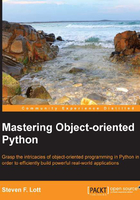
Non collection __str__() and __repr__()
As we saw previously, the output from __str__() and __repr__() are not very informative. We'll almost always need to override them. The following is an approach to override __str__() and __repr__() when there's no collection involved. These methods belong to the Card class, defined previously:
def __repr__( self ):
return "{__class__.__name__}(suit={suit!r}, rank={rank!r})".format(
__class__=self.__class__, **self.__dict__)
def __str__( self ):
return "{rank}{suit}".format(**self.__dict__)
These two methods rely on passing the object's internal instance variable dictionary, __dict__, to the format() function. This isn't appropriate for objects that use __slots__; often, these are immutable objects. The use of names in the format specifications makes the formatting more explicit. It also makes the format template longer. In the case of __repr__(), we passed in the internal __dict__ plus the object's __class__ as keyword argument values to the format() function.
The template string uses two kinds of format specifications:
- The
{__class__.__name__}template that could also be written as{__class__.__name__!s}to be more explicit about providing a simple string version of the class name - The
{suit!r}and{rank!r}template both use the!rformat specification to produce therepr()method of the attribute values
In the case of __str__(), we've only passed the object's internal __dict__. The formatting uses implicit {!s} format specifications to produce the str() method of the attribute values.